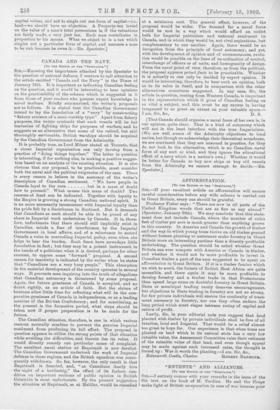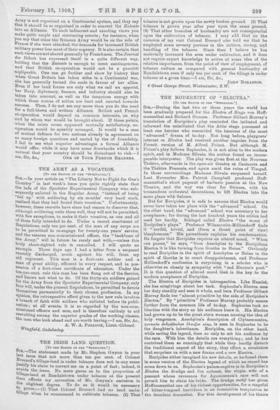"ENTENTE " AND ALLIANCES.
• [TO THE EDITOR OP THE " SPEOTATOR."1
entirely concur with your remarks in the issue of the 6th inst. on the book. of M. Tardieu. He and the Temps make light of British co-operation in case of war because your Army is not organised on a Continental system, and they say that it should be so organised in order to convert the Entente into an Alliance. To such indiscreet and exacting views you make quite ample and convincing retorts ; for instance, when you say that since the Russian Army would be on the side of France if elm were attacked, the demands for increased British military power lose most of their urgency. It is also certain that such views are not shared generally by Frenchmen. The Journal des Debate has expressed itself in a quite different way, holding that the Entente is enough to meet contingencies, and that British co-operation would not be a guantW, negligeable. One can go further and show by history that when Great Britain has taken sides in a Continental war, she has generally turned the scale in favour of her allies. Even if her land forces are only what we call un appoint, her Navy, diplomacy, finance, and industry should also be taken into account, as well as the tenacious energy with which these means of action are bent and exerted towards success. Then, I do not see any more than you do the need for a full-blown and written Alliance. British and French co-operation would depend on common interests, on why and by whom war would be brought about. If these points, when the crisis arose, appeared mutually satisfactory, co- operation would be speedily arranged. It would be a case of mutual defence for two nations already in agreement on so many foreign questions and united by ties of friendship. I fail to see what superior advantages a formal Alliance would offer, while it may have some drawbacks which it is natural that your country should be disinclined to risk.-1
am, Sir, &c., ONE OP YOUR FRENCH READERS.










































 Previous page
Previous page